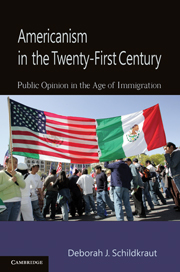Book contents
- Frontmatter
- Contents
- Figures and Tables
- Acknowledgments
- 1 Introduction: American Identity in the Twenty-First Century
- 2 The Twenty-First-Century Americanism Survey
- 3 Defining American Identity in the Twenty-First Century
- 4 Policy Implications of Multidimensional Americanism
- 5 The Myths and Realities of Identity Prioritization
- 6 Does “Becoming American” Create a “Better” American?
- 7 Immigrant Resentment: When the Work Ethic Backfires
- 8 The Politics of American Identity
- Appendix A 21-CAS Survey Questions
- Appendix B Supplementary Tables from Chapter 3
- Appendix C Supplementary Tables from Chapter 5
- Appendix D Supplementary Tables from Chapter 6
- Appendix E Supplementary Tables from Chapter 7
- References
- Index
1 - Introduction: American Identity in the Twenty-First Century
Published online by Cambridge University Press: 05 June 2012
- Frontmatter
- Contents
- Figures and Tables
- Acknowledgments
- 1 Introduction: American Identity in the Twenty-First Century
- 2 The Twenty-First-Century Americanism Survey
- 3 Defining American Identity in the Twenty-First Century
- 4 Policy Implications of Multidimensional Americanism
- 5 The Myths and Realities of Identity Prioritization
- 6 Does “Becoming American” Create a “Better” American?
- 7 Immigrant Resentment: When the Work Ethic Backfires
- 8 The Politics of American Identity
- Appendix A 21-CAS Survey Questions
- Appendix B Supplementary Tables from Chapter 3
- Appendix C Supplementary Tables from Chapter 5
- Appendix D Supplementary Tables from Chapter 6
- Appendix E Supplementary Tables from Chapter 7
- References
- Index
Summary
English-only cheesesteaks
In 2006, a landmark cheesesteak shop in Philadelphia garnered national attention not for its menu but for a sign posted by its owner telling customers, “This is America. When ordering, please speak English.” Owner Joey Vento argued that the sign was aimed not at tourists but at illegal immigrants from Mexico. He gave many media interviews during the controversy, stating in one of them that it is “wrong, wrong, wrong that a Mexican girl comes here to pop a baby,” and that he is only saying “what everybody's thinking but is afraid to say.” Though some potential customers chose to avoid the shop during this time, others eagerly voiced their support for Vento as they waited in long lines for their cheesesteaks (Zucchino 2006). In 2007 then–presidential candidate Rudolph Giuliani campaigned at the shop (Dale 2007). A panel of the Philadelphia Commission on Human Rights ruled in 2008 that the sign was not discriminatory. In response to the flood of support Vento received from across the country, he said, “I woke up America” (Maykuth 2008).
Scared to report crimes to the police
As the federal government failed to enact immigration reform amid cries for change in the early years of the twenty-first century, states, counties, and cities began devising their own policies to address issues that arise from legal and illegal immigration. One increasingly common approach is to enlist local law enforcement agencies in efforts to determine whether a person is in the country legally and to detain them if they are not. In 2007, for example, the supervisors of Prince William County, Virginia, passed a resolution that directed “officers to check the status of anyone in police custody who they suspect is an illegal immigrant” (Miroff 2007). Because the directive does not require all people in custody to be asked their status, Latino residents have voiced fears that the resolution would render them targets of racial profiling. For their part, police officers affected by similar measures in other locales have expressed worries that residents will be less willing to report crimes for fear of increased scrutiny (Ford and Montes 2007). An Arizona statute passed in 2010 sent shock waves across the country for calling on officers to check the status of anyone they suspect of being in the country illegally, regardless of whether the person was already in custody for some other offense. Not only did this law spark fears of reporting crimes to police, but it also generated comparisons to South Africa's apartheid and to Nazism.
- Type
- Chapter
- Information
- Americanism in the Twenty-First CenturyPublic Opinion in the Age of Immigration, pp. 1 - 21Publisher: Cambridge University PressPrint publication year: 2010

